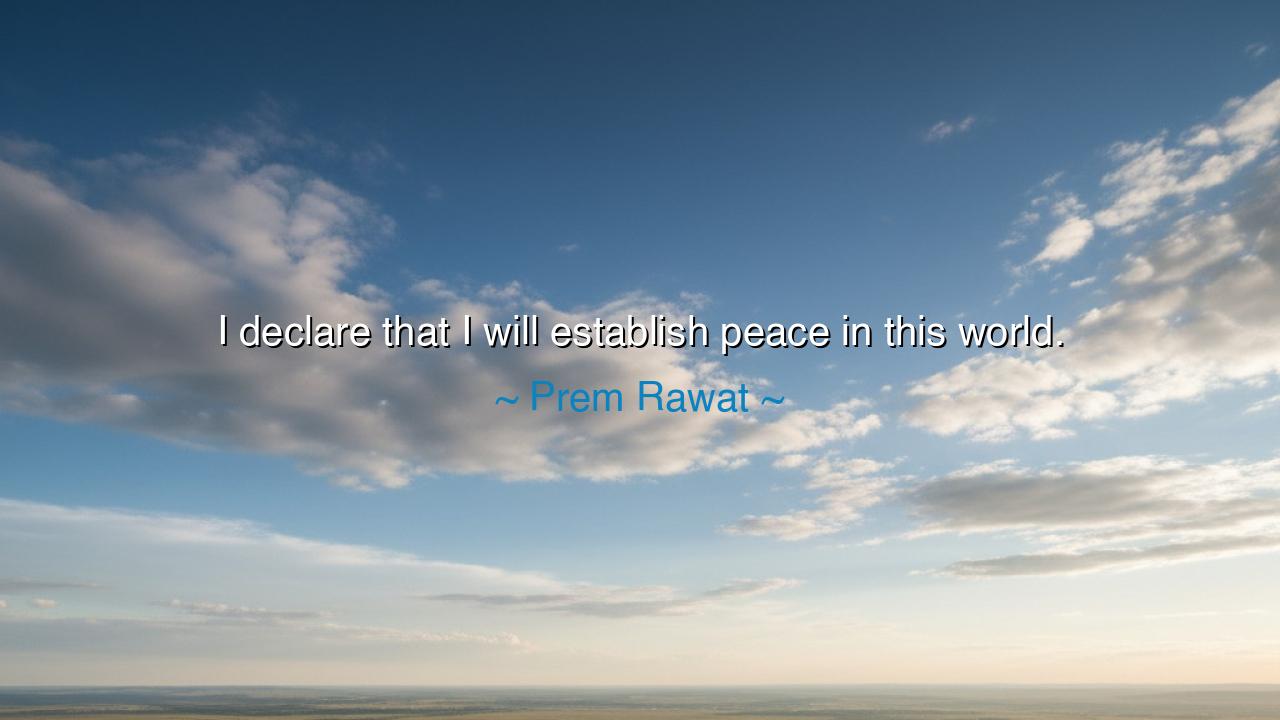
I declare that I will establish peace in this world.






"I declare that I will establish peace in this world." Thus spoke Prem Rawat, and in his words burns the voice of one who dares to bind his life to a vision greater than himself. A declaration is no idle wish, no soft prayer whispered into silence—it is a vow, a promise set against the storms of the world. To declare peace is to stand in defiance of hatred, to speak against the tide of violence and division, and to proclaim that harmony is not a dream for tomorrow but a mission for today. His words echo with the courage of those who knew that change begins not in governments nor armies, but in the heart of a single human being who dares to say, "I will."
The ancients knew well the power of the spoken vow. Did not prophets of old rise before their people and declare visions that seemed impossible? Did not Moses declare the liberation of slaves, though Pharaoh’s armies stood against him? Did not Buddha renounce princely life to declare the path of enlightenment, offering freedom from suffering? In each case, the declaration was the beginning of transformation. So too with Rawat’s words: to establish peace is not to wait for others, but to anchor the vow within oneself, to breathe life into the possibility of a world made whole.
Yet his words also remind us of the heavy burden that peace demands. For the world is filled with conflict, and many dismiss peace as weakness or impossibility. History itself tells us otherwise. Consider the life of Mahatma Gandhi, who declared that India’s freedom would be won not by blood, but by nonviolence. He held fast against ridicule and violence, and though his body was struck down, his declaration lives on in the spirit of nations. Consider Martin Luther King Jr., who declared a dream of equality and peace in a land torn by hatred. His words, like Rawat’s, were not timid hopes, but mighty proclamations that shook nations awake.
Children of tomorrow, hear this: to declare peace is not to speak in empty tones, but to take up the labor of love in a world that often prefers the ease of division. To declare peace is to promise forgiveness where revenge is easier, compassion where anger is natural, and kindness where cruelty reigns. It is to carry within you a light so steadfast that even when the world mocks it, you hold it high. For every age is shaped by those who dared to speak with certainty, who dared to plant seeds that others called impossible.
Practical wisdom lies here. You, too, may declare peace. Begin with yourself: establish peace in your thoughts, for a turbulent mind cannot build harmony. Establish peace in your words, for careless tongues wound deeper than swords. Establish peace in your actions, for even small acts of kindness ripple outward across time. Do not wait for governments or kings—become the vessel of peace where you stand. Like Prem Rawat, say "I will," and let your life become the declaration fulfilled.
Look to the patterns of history: peace is never established all at once, but always through the persistence of many voices. The Quakers in colonial times declared their refusal to take up arms, and their testimony echoed across centuries. The Red Cross began as one man’s conviction to bring relief amid the carnage of war. Each declaration began small, yet became vast. So too can your words, your choices, and your life join the current of those deep forces that push humanity forward.
Thus the lesson is clear: peace begins with a declaration, spoken not as a wish but as a vow, carried into the marrow of daily life. Prem Rawat’s words stand as a torch: the world is filled with darkness, but even in such a place, one voice declaring light can ignite a fire that spreads from soul to soul. Let us, then, not whisper peace as a dream, but declare it as a destiny. And by living it, let us establish it—not only in our lifetimes, but in the generations to come.






AAdministratorAdministrator
Welcome, honored guests. Please leave a comment, we will respond soon